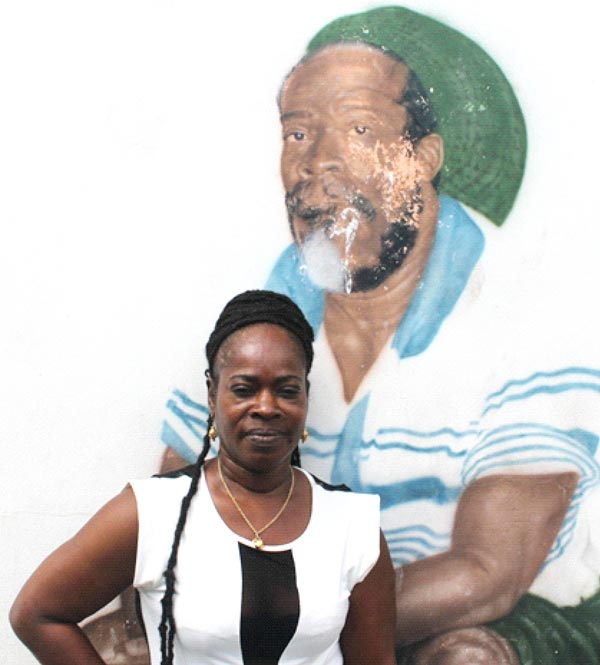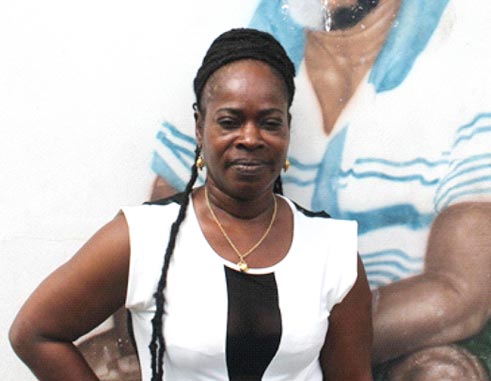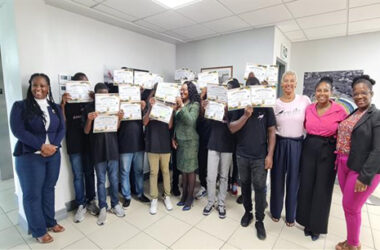Area Representative Makes Impassioned Plea

THE sister of one of the men killed during the period of the police crackdown, “Operation Restore Confidence”, is calling on the relevant authorities to provide better social services for the Wilton’s Yard area, better know as the Graveyard.
Cheryl Clarke told The VOICE that the area that makes the news for all the wrong reasons does have its faults. However, she said, there are many positives that come out of, Wilton’s Yard that go unnoticed.
“We’re like a family unit in here. But what you’ll find is that a few bad eggs from different communities will find themselves here. But you don’t categorize the whole lot because of that few,” Clarke said.
Clarke said that while the Ministry of Social Transformation is working very closely with residents, much more needs to be done so as to arrest the social challenges faced by the small Castries community. She said after-school programmes targeting children from five years old to secondary school age are run five days a week. The programmes include assisting children with their homework and engaging them in arts and craft and sports.
“We still try to look out for and hold onto the youths coming out of the community,” Clarke said.
Clarke’s brother, 48-year-old Arthur “Afoo” Clarke, was shot and killed around 9:50 p.m. on Thursday, January 27, 2011 at Chase Gardens, Castries. According to police, he was near his car at the time when several shots were fired at him, hitting him in the upper part of his body. He was later pronounced dead at Victoria Hospital and no one has since been charged with his death.
Clarke said she remains convinced that police have knowledge of her brother’s killer/s. While she admits that she has no evidence to prove it, she said that although her brother had several run-ins with the police from time to time, he was a man who many Wilton’s Yard residents respected and drew strength from. His death, she said, is still a crushing blow to the tight-knit community on Chaussee Road.
Clarke said most of the people from Wilton’s Yard are working people, adding that residents are talented in many respects. Those who don’t have full-time employment, she said, are engaged in other forms of employment, including hair braiding. But as is the case with any other community across the island, she said bad influences would always creep in. That’s where the need for extra resources from government and social partners comes in, she said.
“Some of the bad ones who come here might be encouraging others to do what they do. But at the end of the day, it’s us that have to help them. We’re willing to do so, hoping that they will give us more assistance with these youths because these youths haven’t got recreation per se,” Clarke explained.
Clarke said the Wilton’s Yard Association formed some years ago still exists, although it is not as vibrant as it used to be. Nevertheless, she said, the aim of creating a positive atmosphere in the area remains high on the association’s agenda. She currently serves as a member of the association and is in the process of organizing an activity to remember those from the area who have lost their lives to violence over the years.
Because of a longstanding tug of war involving residents of Wilton’s Yard and residents from other communities, Clarke said residents are now resigned to living in captivity in their own space. To that end, she said the children of Wilton’s Yard have no freedom to benefit from a wholesome environment. That needs to change, she said.
“Things need to be put in place because most of them cannot leave here and go elsewhere because of the same war thing between communities,” Clarke said. “We can provide simple things like sports equipment, agriculture, education – anything that can probably help them. Find out what they want to do and see how we can help them. But if we never find out what they want, the problems will continue. We need to remember that these are less fortunate children we are dealing with.”
She continued: “They need to reach out to these children. When they take them and put them in Bordelais, they’re not helping them, but training them to become hardcore criminals. That is all they are doing right now. That’s only making these youths rebellious.”
Clarke said the knee-jerk reaction from the public and institutions whenever youths from at-risk communities get into trouble is to condemn rather than prescribe solutions. Finding out what problems are facing the youth and what social backgrounds they come from never seem a priority, Clarke claimed. That instant reaction, she told The VOICE, does more harm than good for such communities that lack the needed resources to create positive change. She said that instead of spending more resources on equipping the police, funds need to be invested in social services to better assist underprivileged families.
“They just judge the youths based on the area they’re from,” Clarke said. “So if you’re from Wilton’s Yard, Grass Street or Marchand, then you’re nothing good. That is the bad thing they have been doing. But there is hope for every child in Saint Lucia – not just from Wilton’s Yard. However, the same good and bad you would get from Wilton’s Yard, you will get it every place else. But there is hope for all our youths and communities. Everywhere has ghettos but love exits everywhere.”







